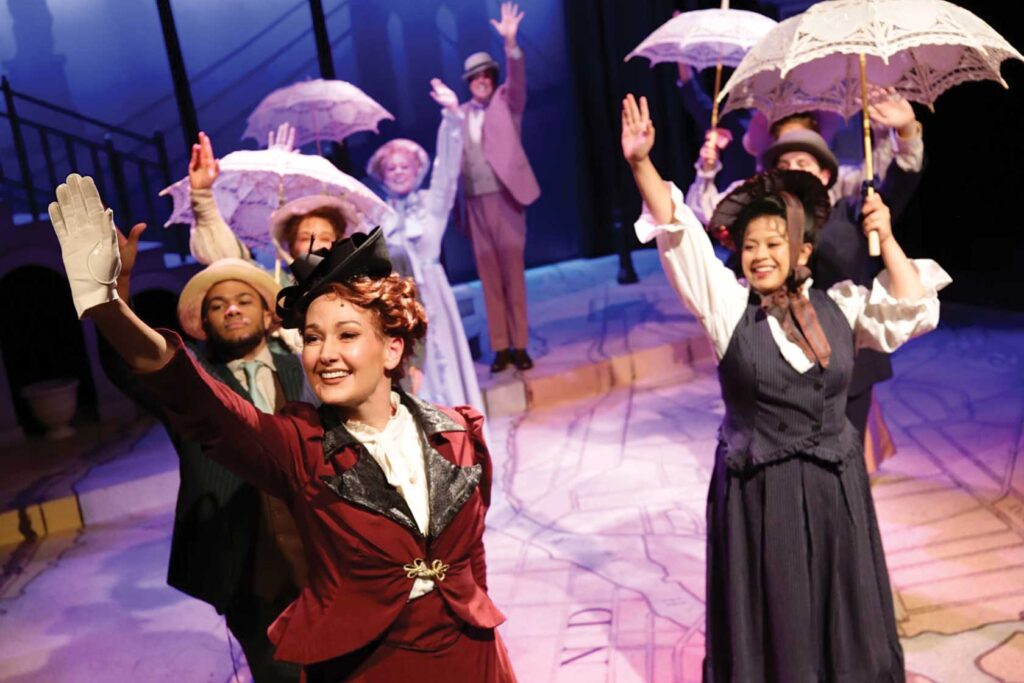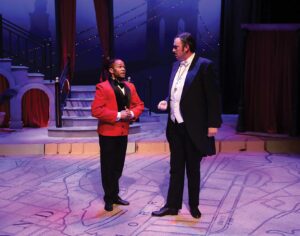
Heart and humor abound in the sensational production of the American musical theater classic “Hello, Dolly!” at Lyric Stage in Boston’s Back Bay through Sunday, June 22.
The Lyric Stage production, running two and a half hours with a 15-minute intermission, is directed by Maurice Emmanuel Parent, co-founder and producing artistic director of the Front Porch Arts Collective, a Black-led theater company committed to advancing racial equity.
Adapting American playwright Thornton Wilder’s 1954 play “The Matchmaker” into a musical, Jerry Herman composed the music and lyrics, and Michael Stewart wrote the book for “Hello, Dolly!” Its first Broadway run lasted from 1964 to 1970 and won 10 Tony Awards. Among the stars who played Dolly was Pearl Bailey, who won a 1968 Tony for her performance in an all-Black production that earned critical raves and drew audiences that included then-president Lyndon B. Johnson and his wife Lady Bird.
Unfolding in 1890s Yonkers, then still a rural town, as well as in neighboring Manhattan, Wilder’s play and its musical reincarnation present a web of interconnected people who vary in status, income and personalities. His wily core character, Mrs. Dolly Gallagher Levi, brings a realist’s eye as well as zest to her matchmaking trade as she assesses her prospects’ talents, tastes, flaws, desires and potential as mates.

Jackson Jirard (left) and Mark Linehan in a scene from the Lyric Stage
production of “Hello, Dolly!” PHOTO: MARK S. HOWARD
Horace Vandergelder, a wealthy but stingy merchant, is played by an often-glowering Joshua Wolf Coleman. His store’s clerks are Barnaby, an upbeat Max Connor and Cornelius, whose evolution from underdog to hero is touchingly rendered by Michael Jennings Mahoney. Kristian Espiritu is magnetic as Manhattan hat shop owner Irene Molloy, and Tamma Beaudreau sparkles as her assistant, Minnie Fay. Horace’s niece Ermengarde, (Sophie Shaw) bleats “Waaaahhh!” in moments of distress as young artist Ambrose (Stephen Caliskan), seeks her uncle’s approval of their marriage.
Aimee Doherty, recipient of two Elliot Norton Awards, is a captivating Dolly. She’s bold but not brassy, and tender and warm as well as exuberant as she goes about her business of making matches that fulfill her clients’ desires for more from life.
Ever enterprising, Dolly readily pulls from an array of calling cards for various services, at one point telling a prospect, “Now, I might also mention I’m available for financial consultation, instruction in the guitar and mandolin, short distance hauling … and varicose veins reduced!”
As the play’s characters transform through her expert tutelage, Dolly also pursues a new life for herself after years of mourning her late husband, Ephraim. She occasionally quotes him and requests a sign from him that her intended — Horace — is a worthy match.
Collaborating with Parent are scenic designer Janie E. Howland, choreographer Ilyse Robbins, lighting designer Karen Perlow, sound designer Alex Berg, and music director Dan Rodriguez, also keyboardist in the production’s eight-member orchestra.
Dolly enters by descending down an aisle, promising several audience members a match. Later, after losing his wallet in a hat shop melee, Horace walks down an aisle asking in a whisper if anyone has seen it. Audience seating surrounds the stage on three sides and on its floor is a period map of New York City and a trap door, a suitable entry for underling clerk Cornelius. The small stage hosts waltz lessons, a marching band, a frantic hide-and-seek, an all-out melee, and a courtroom. A balcony becomes the setting for a posh dinner hosted by Dolly.
Preparing for a consummate night on the town triggers a sequence of spellbinding numbers, and for the ladies, splendid attire by costume designer Kelly Baker and ornate wigs by Kat Shanahan. Milliner Irene delivers an aria to the joys of a hat with long ribbons.
With a celebratory return, Dolly ends her long absence from the Harmonia Gardens Restaurant, which she and Ephraim had frequented years ago. She greets its staff with the musical’s title song. They then erupt into a rhapsodic welcome. While tossing plates like frisbees waiters form kaleidoscopic, geometric formations and chorus lines that evoke the Depression-era stage spectacles of Busby Berkeley. Breakdancers spin and the cast’s tallest performer, Mark Linehan, who plays Rudolph, the Prussian headwater, performs a spectacular tap solo.
As Dolly and her clients enlarge their lives, she observes, “As my late husband, Ephraim Levi, use to say, money — pardon the expression — is like manure. It’s not worth a thing unless it’s spread around encouraging young things to grow!”






